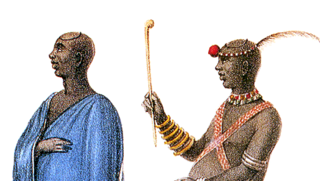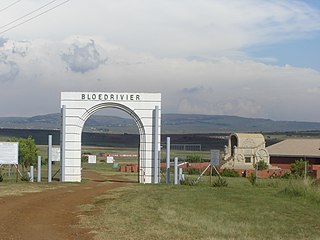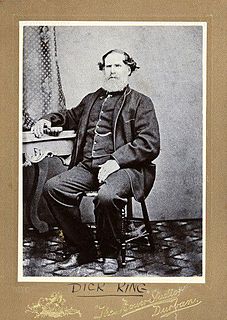See also
- Day of the Vow, originally called Dingane's Day or Dingaansdag
- Dingaanstat, mission station of the Dutch Reformed Church, formerly a village in South Africa
- Dingana dingana, a species of butterfly
Dingane ka Senzangakhona Zulu (c. 1795–29 January 1840), commonly referred to as Dingane or Dingaan, was a Zulu chief who became king of the Zulu Kingdom in 1828
Dingaan is also a given name and may refer to:

The Day of Reconciliation is a public holiday in South Africa held annually on 16 December. The holiday came into effect in 1995 after the end of apartheid, with the intention of fostering reconciliation and national unity for the country. The date was chosen because it was significant to both Afrikaner and black African cultures. The government chose a meaningful date for both ethnic groups because they recognised the need for racial harmony. The celebration of the Day of Reconciliation can take the form of remembering past history, recognising veteran's contributions, marching, and other festivities.

The Great Trek was an eastward migration of Dutch-speaking settlers who travelled by wagon trains from the Cape Colony into the interior of modern South Africa from 1836 onwards, seeking to live beyond the Cape’s British colonial administration. The Great Trek resulted from the culmination of tensions between rural descendants of the Cape's original European settlers, known collectively as Boers, and the British Empire. It was also reflective of an increasingly common trend among individual Boer communities to pursue an isolationist and semi-nomadic lifestyle away from the developing administrative complexities in Cape Town. Boers who took part in the Great Trek identified themselves as voortrekkers, meaning "pioneers", "pathfinders" in Dutch and Afrikaans.

The Boer Republics were independent, self-governing republics formed by Dutch-speaking inhabitants of the Cape Colony and their descendants. The founders - variously named Trekboers, Boers and Voortrekkers - settled mainly in the middle, northern, north-eastern and eastern parts of present-day South Africa. Two of the Boer Republics achieved international recognition and complete independence: the South African Republic and the Orange Free State. The republics did not provide for the separation of church and state, initially allowing only the Dutch Reformed Church, and later also other churches in the Calvinist Protestant tradition. The republics came to an end after the Second Boer War of 1899-1902, which resulted in British annexation and later incorporation of their lands into the Union of South Africa.

Dingane ka Senzangakhona Zulu, commonly referred to as Dingane or Dingaan, was a Zulu chief who became king of the Zulu Kingdom in 1828. He set up his royal capital, uMgungundlovu, and one of numerous military encampments, or kraals, in the Emakhosini Valley just south of the White Umfolozi River, on the slope of Lion Hill (Singonyama).

Andries Wilhelmus Jacobus Pretorius was a leader of the Boers who was instrumental in the creation of the South African Republic, as well as the earlier but short-lived Natalia Republic, in present-day South Africa. The large city of Pretoria, executive capital of South Africa, is named after him.

The Battle of Blood River was fought on the bank of the Ncome River, in what is today KwaZulu-Natal, South Africa between 464 Voortrekkers ("Pioneers"), led by Andries Pretorius, and an estimated 10,000 to 15,000 Zulu. Casualties amounted to over 3,000 of King Dingane's soldiers dead, including two Zulu princes competing with Prince Mpande for the Zulu throne. Three Voortrekker commando members were lightly wounded, including Pretorius.
The year 1838 was the most difficult period for the Voortrekkers since they left the Cape Colony, till the end of the Great Trek. They faced many difficulties and much bloodshed before they found freedom and a safe homeland in their Republic of Natalia. This was only achieved after defeating the Zulu Kingdom, namely the Battle of Blood River, which took place on Sunday 16 December 1838. This battle would not have taken place if the Zulu King honored the agreement that he made with the Voortrekkers to live together peacefully. The Zulu king knew that they outnumbered the Voortrekkers and decided to overthrow them and that lead to the Battle of Blood river.

The Natalia Republic was a short-lived Boer republic founded in 1839 after a Voortrekker victory against the Zulus at the Battle of Blood River. The area was previously named Natália by Portuguese sailors, due to its discovery on Christmas. The republic came to an end in 1843 when British forces annexed it to form the Colony of Natal. After the British annexation of the Natalia Republic, most local Voortrekkers trekked north into Transorangia, later known as the Orange Free State, and the South African Republic.

Pieter Mauritz Retief was a Voortrekker leader. Settling in 1814 in the frontier region of the Cape Colony, he assumed command of punitive expeditions in response to raiding parties from the adjacent Xhosa territory. He became a spokesperson for the frontier farmers who voiced their discontent, and wrote the Voortrekkers' declaration at their departure from the colony.

The Day of the Vow was a religious public holiday in South Africa. It was an important holiday for Afrikaners, originating from the Battle of Blood River on 16 December 1838.
The Zulu royal family consists of the king of the Zulus, his consorts, and all of his legitimate descendants. The legitimate descendants of all previous kings are also sometimes considered to be members.

Richard Philip King (1811–1871) was an English trader and colonist at Port Natal, a British trading station in the region now known as KwaZulu-Natal. He is best known for a historic horseback ride in 1842, where he completed a journey of 960 kilometres (600 mi) in 10 days, to request help for the besieged British garrison at Port Natal.
INduna is a Zulu/Xhosa title meaning advisor, great leader, ambassador, headman or commander of a group of warriors. It can also mean spokesperson or mediator, as the iziNduna often acted as a bridge between the people and the king. The title was reserved for senior officials appointed by the king or chief and was awarded to individuals held in high esteem for their qualities of leadership, bravery or service to the community. The iziNduna would regularly gather for an indaba to discuss important issues.

The Zulu Kingdom, sometimes referred to as the Zulu Empire or the Kingdom of Zululand, was a monarchy in Southern Africa that extended along the coast of the Indian Ocean from the Tugela River in the south to Pongola River in the north.

Nada the Lily is an historical novel by English writer H. Rider Haggard, published in 1892. It is said to be inspired by Haggard's time in South Africa (1875–82). It was illustrated by Charles H. M. Kerr.

The Shaka Memorial is a provincial heritage site in Stanger in the KwaZulu-Natal province of South Africa. It marks the resting place of the Zulu King Shaka near the site where he was assassinated by his half-brothers Dingane and Mhlangana while sitting on a rock near the barracks at his capital Dukuza.

uMgungundlovu was the royal capital of the Zulu King Dingane (1828–1840) and one of several military complexes (amakhanda) which he maintained. He established his royal kraal in 1829 in the eMakhosini valley against Lion hill (Singonyama), just south of the White Umfolozi River.
Dingana dingana, or Dingaan's widow, is a butterfly of the family Nymphalidae. It is found in the KwaZulu-Natal midfields from the Drakensberg foothills to the Mooi River.

Dingaanstat is the 'stat' or village of Dingaan. The village is known to the Zulu as Umgungundlovu, and was under Zulu rule from 1795 until 1840. Now a mission station of the Dutch Reformed Church, it is situated between Melmoth and Babanango.

The Piet Retief Delegation massacre was the 1838 killing of 100 Voortrekkers by the Zulu king Dingane in what is now KwaZulu-Natal, South Africa. The Voortrekkers, led by Piet Retief, migrated into Natal in 1837 and negotiated a land treaty in February 1838 with Dingane. Upon realizing the ramifications of the imposed contract, Dingane betrayed the Voortrekkers, killing the delegation including Retief on 6 February 1838. The land treaty was later found in Retief's possession. It gave the Voortrekkers the land between the Tugela River and Port St. Johns. This event eventually led to the Battle of Blood River and the eventual defeat of Dingane.
Francis Owen was the first English missionary to the Zulu kingdom, then ruled by King Dingane. He and his household were the only white witnesses to the massacre of Piet Retief and his approximate 80 followers in February 1838 in the Zulu capital of Umgungundlovu. He is also the only European to leave a detailed account of life in the Zulu court and travelling through Natal at that time.